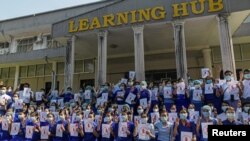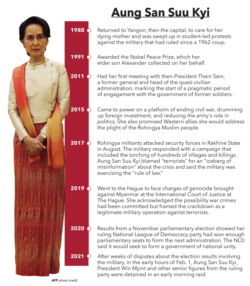Hundreds of demonstrators took to the streets of Myanmar’s capital Friday in the largest protests since Monday’s military coup, as the military expanded its dragnet against ousted officials.
Protestors at Myanmar University and Yangon University, both in the city of Yangon, demanded that the military hand power back to Myanmar’s elected officials.
They chanted “Long live Mother Suu,” a reference to deposed leader Aung San Suu Kyi, and “We don’t want military dictatorship.”
Suu Kyi was detained Monday and faces charges of illegally importing and using six unregistered walkie-talkie radios found in a search of her home in the capital of Naypyidaw.
There was also at least one protest in Naypyidaw, where Win Htein, a senior member of Suu Kyi’s deposed National League for Democracy party, was arrested. Party spokesman Kyi said he was taken from his home on Friday before the university protests began.
Government officials from various agencies joined the protest in Naypyitaw, including those from the ministry of electricity and energy, and the ministry of ethnic affairs and social welfare.
Like many other protestors, they donned red ribbons and raised a three-finger salute, a sign of resistance against tyranny in the ‘Hunger Games’ movie.
Health care workers at Naypyitaw’s largest hospital also participated in the rally, gathering behind a large banner denouncing the takeover.
Protests, sometimes led by people from Myanmar, were also held Friday in India, Indonesia and South Korea.
The military takeover began with the detention of Suu Kyi, who was the country's de facto leader, and other senior government officials. Suu Kyi is healthy as she remains under house arrest at her official residence in Naypyitaw, according to party spokesman Kyi Toe.
The Myanmar military said its state of emergency, set to last one year, was necessary because the government had not acted on claims of voter fraud in November elections that were overwhelmingly won by Suu Kyi’s NLD party.
The coup has been condemned by U.S. President Joe Biden and other world leaders, who called for the elected government to be restored to power.
Myanmar, also known as Burma, has long struggled between civilian and military rule but until the coup had been enjoying a hopeful transition to democracy.
A British colony until 1948, Myanmar was ruled by military-dictators from 1962 to 2010.







